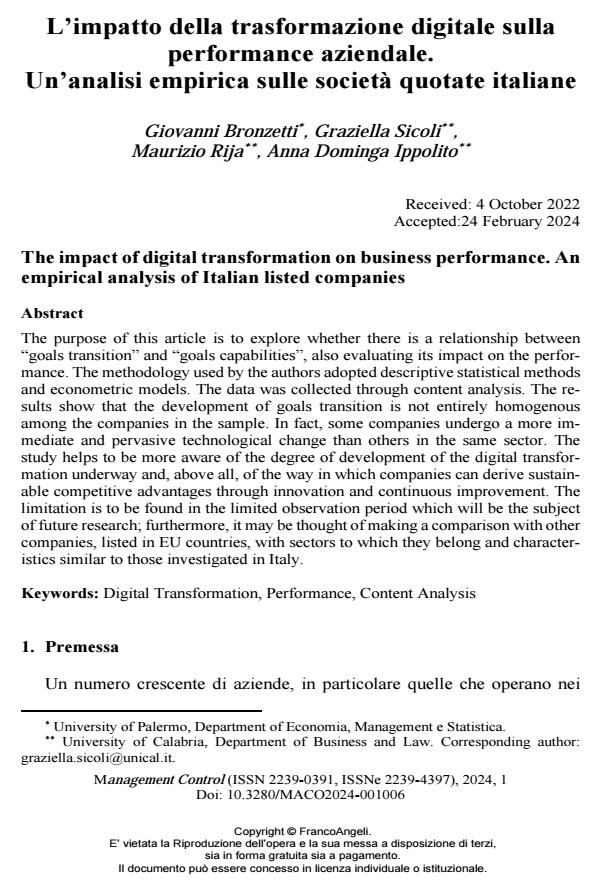L’impatto della trasformazione digitale sulla performance aziendale. Un’analisi empirica sulle società quotate italiane
Titolo Rivista MANAGEMENT CONTROL
Autori/Curatori Giovanni Bronzetti, Graziella Sicoli, Maurizio Rija, Anna Dominga Ippolito
Anno di pubblicazione 2024 Fascicolo 2024/1
Lingua Italiano Numero pagine 22 P. 109-130 Dimensione file 282 KB
DOI 10.3280/MACO2024-001006
Il DOI è il codice a barre della proprietà intellettuale: per saperne di più
clicca qui
Qui sotto puoi vedere in anteprima la prima pagina di questo articolo.
Se questo articolo ti interessa, lo puoi acquistare (e scaricare in formato pdf) seguendo le facili indicazioni per acquistare il download credit. Acquista Download Credits per scaricare questo Articolo in formato PDF

FrancoAngeli è membro della Publishers International Linking Association, Inc (PILA), associazione indipendente e non profit per facilitare (attraverso i servizi tecnologici implementati da CrossRef.org) l’accesso degli studiosi ai contenuti digitali nelle pubblicazioni professionali e scientifiche.
The purpose of this article is to explore whether there is a relationship between “goals transition” and “goals capabilities”, also evaluating its impact on the per-formance. The methodology used by the authors adopted descriptive statistical methods and econometric models. The data was collected through content analy-sis. The results show that the development of goals transition is not entirely ho-mogenous among the companies in the sample. In fact, some companies undergo a more immediate and pervasive technological change than others in the same sector. The study helps to be more aware of the degree of development of the digi-tal transformation underway and, above all, of the way in which companies can derive sustainable competitive advantages through innovation and continuous improvement. The limitation is to be found in the limited observation period which will be the subject of future research; furthermore, it may be thought of making a comparison with other companies, listed in EU countries, with sectors to which they belong and characteristics similar to those investigated in Italy.
Parole chiave:Digital Transformation, Performance, Content Analysis
Giovanni Bronzetti, Graziella Sicoli, Maurizio Rija, Anna Dominga Ippolito, L’impatto della trasformazione digitale sulla performance aziendale. Un’analisi empirica sulle società quotate italiane in "MANAGEMENT CONTROL" 1/2024, pp 109-130, DOI: 10.3280/MACO2024-001006